![]()
The Words of the Kaufmann Family
|
|
The Words of the Kaufmann Family |
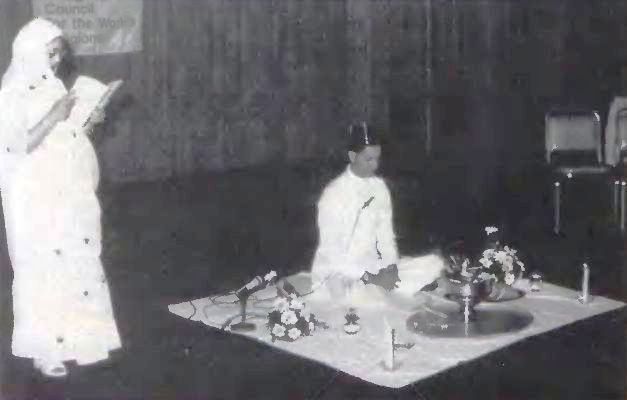
A
Zoroastrian morning service conducted at CWR's 1987 interfaith
conference in Harrison Hot Springs, Canada.
Frank Kaufmann is the Executive director of the CWR.
Question: In what specific ways has the Council for the World's Religions helped religions grow in awareness and cooperation with one another?
Primarily through the direct give and take people experience at our conferences. The Council sponsors three basic kinds of conferences intrareligious conferences, which focus on unity within one specific religion, inter-religious conferences, in which several specific religions are brought into dialogue, and an annual interfaith conference, in which all the major world religions are represented. Each type of conference has its own dynamic and its own unique difficulties.
Intrareligious issues are different from inter-religious ones. The intrareligious conferences are designed according to themes that are unique to the problems of a particular religion. There is a certain way in which, say, Christians can talk to each other that transcends the "type" of Christian they are. In a sense, only Christians can really understand each other. Ultimately it is up to them to solve the problems within their own family. The same is true for all other religions. No matter how divergent their denominations are, when believers of one faith get together and sincerely begin to dialogue, they cannot help but discover that the other participants are their very own brothers and sisters, who just happen to be from some other part of the family. This kind of beautiful discovery and the joy it produces is entirely different from the experiences that occur when people talk across the great traditions. Neither is better than the other, but an ecumenical organization that fails to acknowledge these subtle differences is not likely to have long-standing success in the effort to create religious harmony in the world.
One of the important things the Council does is provide religious leaders with the opportunity to be in the company of people they would not otherwise meet. This alone is a vital element in the process. Regardless of how broad-minded or well-intentioned a leader might be, it is virtually impossible to really know and understand another denomination or religion if you have never met a person who follows that tradition. Very often the participants will discover at the conference that they have been mis-educated, misinformed, or misguided as to the belief structure and lifestyle of their own fellow believers! At a recent Buddhist conference, scholars from both of the two major Buddhist denominations admitted publicly that they were startled to discover how many of their beliefs and attitudes about the other denomination were based on simple prejudice and ignorance. Through this, they could take a big step toward loving and respecting all their fellow Buddhists.
The leaders who attend our seminars are, in a way, like antennae coming out of their own insular communities of faith to discover that there is tremendous ground for unity. Then they have the difficult task of going back to their people and sharing with them the depths of their enlightenment experience. This kind of encounter is also an important aspect of the Council's work.
But beyond the benefits that come from encountering one another in dialogue, concrete ways to solve actual problems are being generated through the Council. For example, we found that divisions within Buddhists are partly due to the fact that the founders of the different
Buddhist sects taught and wrote in different languages. Certain forms of Buddhism are Japanese, certain forms are Chinese, certain forms are Indian, certain forms are Sri Lankan, etc. Therefore, the religious disunity may not be so much because of doctrinal differences but because one sect utterly misunderstands the teachings of the other. How many Sri Lankan priests would you imagine speak Japanese? Consequently, they may totally misunderstand the nature of Zen and judge it as not true Buddhism. When this problem was pinpointed at one of our conferences, steps were taken to create Buddhist translation societies.
Many interdenominational misunderstandings stem from cultural differences. Religious leaders who are educated and aware can recognize this through their experiences at our conferences and can go back and introduce ways to educate their followers that can foster cultural tolerance.
In addition to the solutions that these people of God come to on their own, there is also the guidance that they receive from Father. I regard Father to be the source of, or a channel through which, God's education for the religious world occurs. So far, at every CWR conference Rev. Kwak has delivered a speech, read on Father's behalf, in which he elucidates Father's vision and guidance. Father's vision is broad, startling, and captivating. His words almost always awaken in our guests a deeper clarity and vision of what is possible.
But no matter how great one believes Father's wisdom to be, certainly he cannot solve the problems of the other religions single-handedly. Finally each religion must achieve this by its own believers' wisdom and capacity. We can never presume to impose solutions to other people's problems. On one hand, each of the conferences is set up so that the people of that religion can work out their own solutions, which is the only way it can successfully happen. Yet on the other hand, it is clear that no religion has ever done it so far. So it is the participants' revived efforts in harmony with Father's insights and hopes and dreams for them that can produce new growth and new victories. I think this combination is what gives the CWR a chance for success.
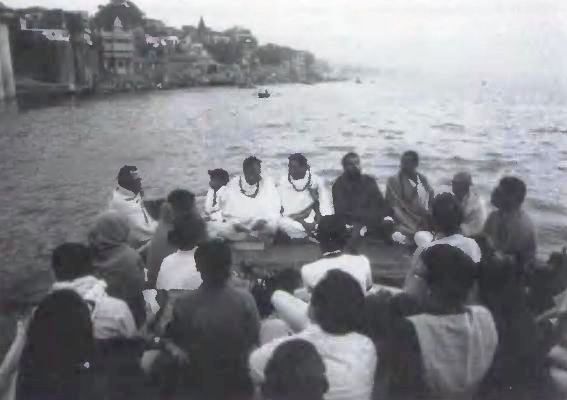
Sunrise
on the Ganges. Local Hindu priests hold a service for participants of
the 1986 intra-Hindu conference in Varansi, India.
Question: How is the CWR related to the Assembly of the World's Religions?
Because the names are so similar, people sometimes confuse the two. The Assembly of the World's Religions is a large quadrennial conference that draws upon all the resources of the International Religious Foundation. It is run by the IRF director Dr. Thomas Walsh. The CWR, as well as all of the other IRF projects, contributes to the Assembly. The next Assembly will occur in 1989 in Korea. As the Assembly draws near, the CWR will devote more and more of its resources to Assembly preparations. In the following years, the CWR will carry forward those inspirations from the Assembly that are appropriate to the Council, and it will build up the network and resources of the IRF to contribute to the next Assembly.
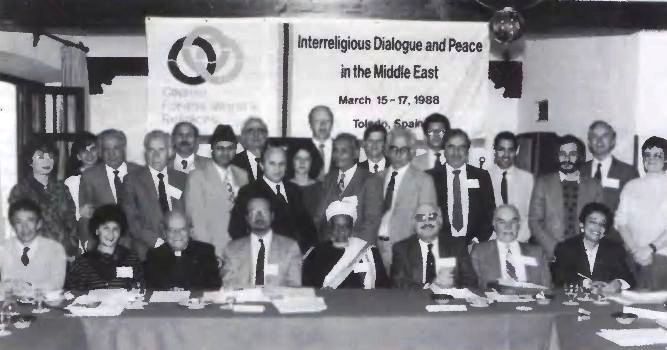
CWR
conference for the religions of the Middle East, held in Toledo,
Spain, in March 1988.
Question: How many people have been attending CWR conferences?
In 1985 there were just 20 or 25 people at each of the five interfaith conferences. Now there are literally hundreds. Father gives people so much freedom that they are attracted to the process and they want to share it with others.
Question: How do the participants relate to Father?
In the network of CWR people, there is a tremendously high percentage of people who are really respectful of Father, who love Father. You can hear these people in endless praise of Father at our conferences. I think in some ways it is much easier for participants at a CWR conference to understand Father than it is for a scientist attending an ICUS, for example, to understand him. You see, almost all the CWR contacts are seriously religious people. It is not hard for them to grasp Father's heart because they have also devoted their life to God. They already know the rigors of leading a pure and religious life, and they know how difficult it is to lead a religious community. Yet they see in Father a man who has transcended all of the natural dangers and temptations that religious leaders can fall prey to -- not the least of which is the temptation to be small-minded, to be interested only in one's own movement. The very fact that they find themselves at a conference for Hindus (or whatever) sponsored by a leader of an entirely different religion forces them to think, "My religion has never done this. We've been around for 4,000 years and we've never sponsored even one conference like this!"
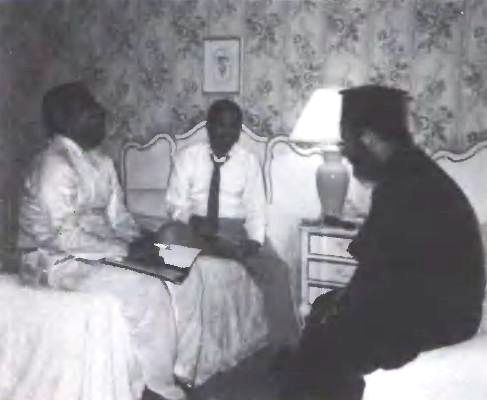
At
the 1986 God Conference in San Diego, Dr. Frank Kaufmann meets with
(in white) Shrivatsa Goswami, heir apparent of a large Chaitanyat
Hindu denomination in India, and (in black) Father Petro Bilaniuk, a
priest of the Ukranian Catholic Church.
Question: What process do you go through in organizing a conference and choosing the people to head it up?
In the beginning of the CWR, we asked our consultants to be the convenors of our first conferences. From there we began to discover who might be good future conveners. It just takes one conference to get things started. At each conference you begin to see new themes and people emerging. "Heart" calls to you from beneath the words that are being spoken, and you can hear the Spirit say to you, "This is the right person for next time. This is the theme." It is definitely spiritual. We always need to be objective to the speaking of the spirit. It is possible, of course, to plan conferences far ahead of time, but I personally do not believe in doing that.
I think that each conference is the encounter out of which the theme and the leader for the next conference will emerge.
For example, last October we had a Jewish conference. In the middle of the conference I found myself with three rabbis in my hotel room one night. Two of these men were extraordinarily influential in their communities. They had come by at around 9:00 in the evening to discuss possible ideas for the next conference. The time flew by. Suddenly one looked at his watch and said, "Oh my God! Its 2:30 in the morning! How are we going to get through tomorrow? I'm never up this late." I felt a little sorry as these men of distinction finally dragged their tired selves to my hotel door. But out of that spontaneous meeting these three men became the planning committee for the next Jewish conference we will be having this September. How can you plan for something like that? So I think the conferences should not just be events that are scheduled for their own sake. I think that someone should be there with vision, care, heart, and openness, trying to hear and see who and what should come as the next step.
Suppose I plan arbitrarily that two years from now we will do a conference on a certain religion's doctrine. But perhaps at this year's conference I discover that doctrinal matters are not the main issue involved at all. If I went ahead with my prescribed plan, then no matter how cleverly I organized everything I would be wasting time, money, people -- everything.
Once a leader emerges, we work up a conference theme together. I offer what sounds to me like a good theme, and the convener will respond from his or her own wisdom and experience.
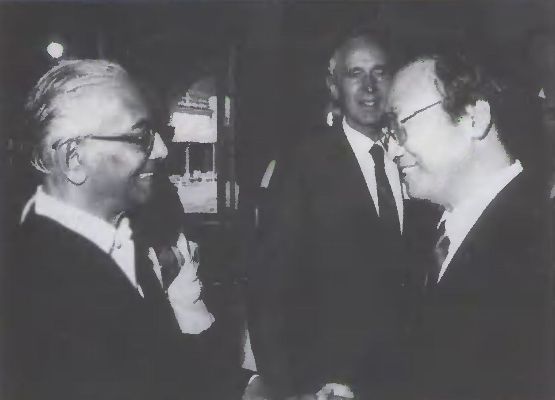
At
the Bad Nauheim interfaith conference, in 1986, Rev. C. H. Kwak
greets Sri Arabinda Yaw, director of the Aurobindo Ashram and
Institute, India.
Question: How do you prepare yourself internally for a conference?
Although it certainly cannot hurt to do conditions at the time of the conference, I am a person of the conviction that if you have not been very careful every step of the way, there is not much you can do to fix what has been carelessly or sloppily prepared for. Another thing I believe is that all actions, no matter how seemingly mundane or insignificant, have qualities. Two actions may look the same on the surface but only one will yield fruit -- the one that is done with heart. The person responsible should put his whole self into each action with a desperate longing that God's hopes can be fulfilled through it. You should try to imagine that the task at hand is the only thing you will ever do, that God will look at it and decide about you based on that one act alone -- even if it is filing one piece of paper.
The things we do in preparation for each conference should have that essential quality about them. For example, I should be urgent and desperate even when I am mailing out the invitation letters, even though that task is furthest from the actual time of the conference. If my staff members sloppily stuff pieces of paper into envelopes just to get them in the mail and then say, "Thank God, that's finished," they have already started the conference with a poor quality of heart. A conference often takes a year or more to prepare, and there are dozens of communications involved. Every single one of these steps should be done with the same passion and urgency that one has the night before a conference. You never know which moment will be the one in which God is looking for a condition of heart. Suppose the most important thing for one entire conference is having one particular person attend, and the staff member making his or her travel arrangements does a poor job. What if this person became lost somewhere en route to the conference, or arrives at the conference too upset to receive guidance from the Spirit? Every single little thing that is ever done involving the participants should be done with the utmost care and concern.
Our staff meets regularly and prays regularly. We are always checking our internal attitudes. There is a wide variety of types of spirituality on my staff, but there is a common commitment among all of us that tin time and the money spent in order to have high-quality conferences will actually lead to religious unity. We don't hold conferences for their own sake. We don't hold conferences to look good, to show that Father does a lot of things. Each one is carried out for the express purpose of achieving peace on earth.
We on the staff of the CWR feel that we have to be the first center of religious harmony. In a way, we have all different religions. Even though we are all Unificationists, we are all different in our deepest selves. Each one of us has a unique relationship to God. That is God's favorite thing about us. No one can love God exactly as Marcia can. If someone could, then God would not have needed to create Marcia. So with our unique and different beliefs and approaches to the precious elements of our shared faith, we ourselves have to be a kind of living incarnation of harmonizing differences, within our own office. That's the first step. If the workers whom God has gathered to carry out Father's vision of religious harmony cannot tolerate each other's spirituality, what chance could we possibly have of bringing about religious harmony on the global scale? The first unity must be with the individual and God, True Parents, and the True Children. Then we need to have trust, openness, and respect for each other's understanding and approach. You yourself must become the incarnation of what you are trying to make happen in the world. We can have all the conferences in the world, have billions of people come to our conferences, and have great picture- books to give to Father, but whether or not peace happens depends on whether it lives in the hearts of those responsible to bring it about. It can only happen to the degree that the ideal is given existence in the world through you.
There is a tradition at all IRF conferences that the staff prays together early every morning throughout the conference. It is inevitable, as with everything in our lives, that when the event actually arrives there is a certain natural urgency that comes over you. Then it is easy to pray. So right before the conference there tends to be a lot more prayer. That is a gift. It is freely given to you by the circumstances.
Of course God can teach us lessons through our failures to properly prepare for a conference, either spiritually or practically. But personally, I would much rather save God the expense of having to teach me a lesson if it means allowing one of His conferences to mess up in order for me to learn that lesson. This is one of the reasons why I concern myself so much with attitude during preparation.
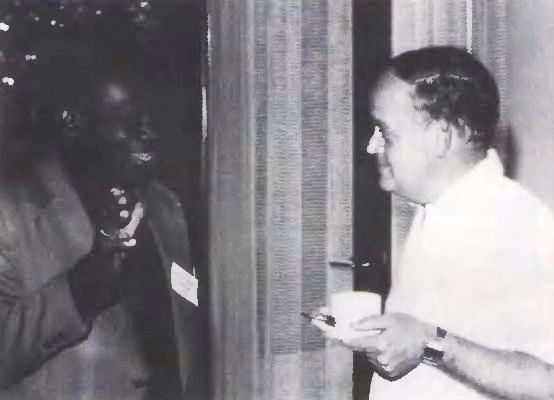
A
Catholic bishop from Ghana chats with Pastor Gerrie Lubbe, a Dutch
Reformed minister from South Africa, at the Bad Nauhelm interfaith
conference.
Question: What are some of the challenges you face as the person most responsible for the Council?
The hard part, I think, is responding to selfishness. Father is so generous and so unconditionally giving, and when you find people deliberately exploiting Father's resources and generosity, it is very hard to maintain that position of unconditional giving. And yet each person needs grace. They need the chance to discover that Father is so good that you would not want to do that to him.
Sometimes I will find myself in the process of making travel arrangements for someone who I know is clearly exploiting Father. These moments are very difficult. If I get hard and unyielding and cancel that person because he obviously has the wrong motivation, I might be depriving him of the chance to have a conversion experience. Many of our very best friends are people who originally came with a kind of antagonism toward us. If we relied only on initial attitudes, we would lose wonderful people. Paul, the greatest Christian missionary, first met Christ in the process of persecuting the Christians. It's hard to remain tolerant long enough to give these people a chance to be knocked off their horse. On the other hand, we also have to know when we are simply wasting money and causing Father indignity. This I think is one of the challenging aspects of my job.
Question: What are the most important things you have learned and gained from your experience with the CWR?
I can't even begin to realize everything I have gained and learned from this work. First of all, because my work requires me to travel a great deal, I have learned how to behave properly and respectfully as a guest in dozens of cultures that are not my own. The people I serve are the living sages and saints of this age, and I have learned how to attend those people in ways that enable our relationship and common purpose to bear fruit. I have learned a tremendous amount about the beliefs and practices of every religion. I have seen the unique dynamics of exchange that exists within each religion, and between religions. I have learned about the nature of dialogue quite profoundly and the many different forms it takes.
I have also learned a fascinating side of life that might be described as administrative leadership. The intricacies of relationships with those above you, below you, and at the same level as yourself are sensitive and elaborate. One can do either poorly or well in handling this area of life. Thus even simple matters of organization, administration, and corporate behavior have been new and inspiring to me.
Finally I have had the opportunity to see Father in a unique light. I deal with people of exceptional religious caliber.
Often I think that if a person had the opportunity to come in contact even once with one of these great religious leaders and experience the kind of grace, love, and wisdom they exhibit, that person couldn't help but become a Muslim, or an Orthodox Christian, or whatever, just from being in that leader's presence. These leaders have the power to represent their religion in all of its beauty and glory. And I have had the unique opportunity to consider Father in relationship with the very best people in the area that is most important to him -- the world of religion. Thus
I have been able to see Father's uniqueness and greatness compared to his peers.
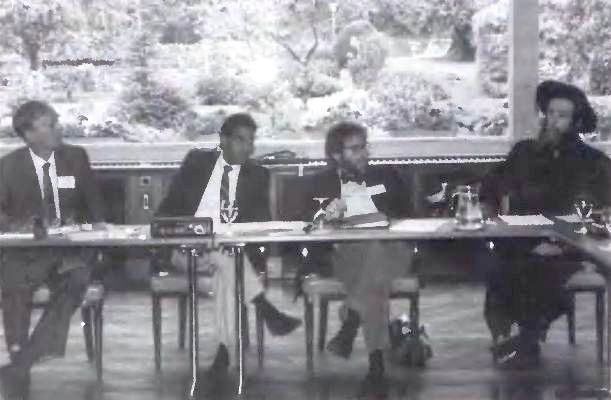
Discussion
at the 1986 intra-Jewish dialogue in Vitznau, Switzerland. Left to
right: Dr. Francis Clark, CWR senior consultant; Dr. Frank Kaufmann;
and two participants.
Question: Have you received any direct guidance from Father?
Father's vision for the Council has come to me through Rev. Kwak. As the CWR director I have not had the chance to meet with Father personally so far, but each year we give Father a book with a report so he can see the development of the Council. In his address at the graduation ceremony at the Seminary last year, Father described the work of the Council as performing miracles. It was a great joy for me to hear that.
I have had the very good fortune of being in close contact with Rev. Kwak throughout the whole time of the development of the CWR. One of the special joys of this job has been to have the chance be with Rev. Kwak off in some distant and quiet corner of the world. This is very different from meeting with him when he is in his New York office trying to see 45 people in 12 minutes.
I have been blessed to have a few peaceful and deep moments with him.
Question: Does the Council have any new plans for 1988?
This year we are doing two conferences in which religions that are in conflict in one specific geographical area come together to seek ways to achieve peace. We're doing a conference for religions of the Middle East, and also a Hindu-Sikh dialogue. These are new.
It is my dream to make the Council profoundly relevant -- not as simply the sponsor of pleasant and uplifting experiences but as a vehicle to actually bring world peace. It is difficult to measure whether or not this is occurring, but nevertheless, that is all I really hope for. I want the Council to actually change the world.
Question: Have you experienced any miracles in your work?
There are a lot of special joys that I would call miracles. Of course, no water has been turned to wine; the miracles occur more at the level of the deep currents than of the spray of the waves. The tearful moments, the changes that occur in the hearts of people -- these things are the evidence of how well we have prepared, how deeply we have all cared and prayed. A miracle is when a participant writes in his evaluation, "I never thought I could believe in what I do now. Please thank Rev. Moon for inviting me here. And please tell me if there's anything I can do for you." A miracle is when you see a Jew and a Muslim embracing in tears, not being able to pull themselves apart in time to catch their flights back home. There's a picture in one of our CWR albums of a white Dutch Reformed minister from South Africa embracing a black Catholic bishop from Ghana -- two people who are symbols of every imaginable enmity in the world.
These are the miracles. The miracle is when people are transformed, and a new step toward peace and harmony is achieved. There are so many things like this happening, and the participants really do realize that these moments are being made possible by Father.
One of the interesting things that happens at our conferences is that people find the realm of Father's heart to be their real "home." In a way they do not want to leave. They would rather be at a CWR conference with their new friends from the other religions than back home in their traditional environments. They may say to themselves, "My true brothers and sisters are here at this conference, even though one is a Hindu, one a Jew, and another a Christian. When I go back home, I'll continue to share my religious life with my fellow Muslims, but in a curious way, the people who really believe the same thing I do are right here. I can't wait until next year, when we can all be together again.